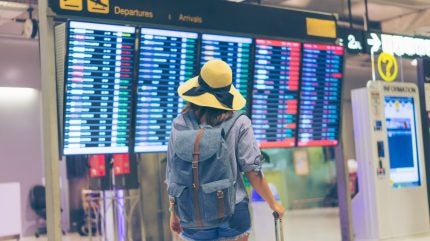
Airlines operating in the US will have to provide automatic refunds to passengers whose flights are cancelled or significantly altered under new rules announced by the US Department of Transportation (DOT).
In the Biden Administration’s latest crack down on the aviation industry, airlines will also have to inform passengers upfront of charges relating to baggage and flight changes.
Transportation Secretary Pete Buttigieg said that the new rules would save passengers time and money by ensuring they know the true cost of a flight and avoiding the need to ask for money they are owed when flights are significantly changed.
He said: “Airlines should compete with one another to secure passengers’ business—not to see who can charge the most in surprise fees.
“DOT’s new rule will save passengers over half a billion dollars a year in unnecessary or unexpected fees by holding airlines accountable for being transparent with their customers.”
In addition to automatic cash refunds within 20 days for altered flights, the DOT’s regulations would also ensure that passengers will see money back if services they had paid for were not delivered, such as WiFi or seat selection.
How well do you really know your competitors?
Access the most comprehensive Company Profiles on the market, powered by GlobalData. Save hours of research. Gain competitive edge.

Thank you!
Your download email will arrive shortly
Not ready to buy yet? Download a free sample
We are confident about the unique quality of our Company Profiles. However, we want you to make the most beneficial decision for your business, so we offer a free sample that you can download by submitting the below form
By GlobalDataThose who file a mishandled baggage claim will also be entitled to a checked bag fee refund if it is not delivered with 12 hours of their arrival for a domestic flight and within 15-30 hours for an international flight, depending on the length.
While announcing the DOT’s new rules at an event at Ronald Regan Washington National Airport, Buttigieg cited recent action such as the $140m fine delivered to Southwest Airlines in 2023 as evidence for a “new standard” of enforcement by the department.
However, aware of the pushback the decision may elicit from some areas of the industry, the Transportation Secretary was also keen to highlight his department’s work with airlines, he said: “To be clear, we want the airline sector to thrive.
“It’s why we put so much into helping them survive the pandemic, and honestly, it’s why we’re being so rigorous on passenger protection. This will build confidence in air travel at a time when airlines need to do more to secure passengers’ trust.”
On the industry side, while avoiding any direct pushback to the new rules, trade association Airlines for America highlighted the industry’s existing work on providing refunds to passengers.
The organisation pointed out that more than $10bn of refunds had been issued by US airlines in 2023 and refund-related complaints to the DOT had dropped dramatically since they peaked at more than 20,000 a month in May 2020, though they remain significantly higher than before the pandemic.



